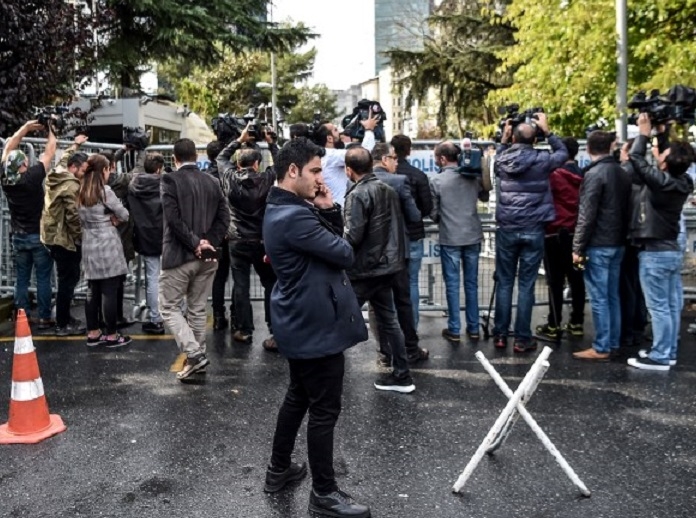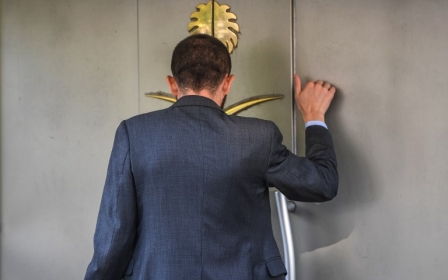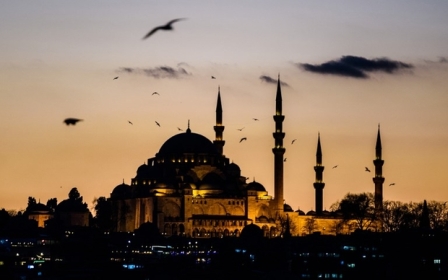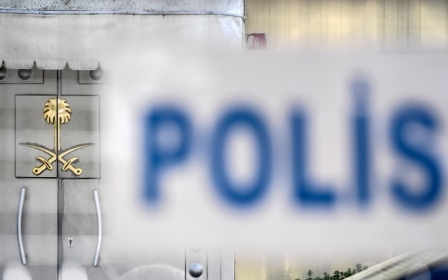How Saudi media has reported Jamal Khashoggi's disappearance

Media outlets inside Saudi Arabia have been largely silent since the disappearance of veteran Saudi journalist Jamal Khashoggi in Turkey last week.
However, Saudi-owned newspapers and TV stations outside the kingdom covered the case with interest. Here's what they have reported:
'Ordinary Saudi tourists'
Al-Arabiya reported that photos and videos of the 15 Saudis who arrived in Istanbul the day Khashoggi disappeared which have circulated in Qatari and Turkish media outlets are, in fact, footage of "ordinary Saudi tourists".
Among the images that have been shared in the media is an old photo of Salah Muhammad al-Tubaigy, one of the Saudis who is thought to have entered the country last week, the paper reports.
Social media users compiling public record information soon after the names of the 15 Saudis were leaked in Turkish media have found evidence suggesting that he is the head of forensic evidence for Saudi general security.
Arabiya reports that the photo was from a previous trip that al-Tubaigy and his wife took to Istanbul.
"Manipulating the photograph of the Saudi tourist and his wife regarding the Khashoggi case serves to highlight the obvious disinformation on the whole issue," writes the newspaper.
"Accordingly, pictures of innocent civilians are used to involve them and to fabricate a fictional story about the disappearance of Khashoggi."
Khashoggi reports are defamation campaigns which 'lack basic standards'
In an editorial on Friday, the newspaper Al-Riyadh Daily characterised many of the reports about Khashoggi this week as defamation campaigns targeting the kingdom which "lack basic standards of logic" - and from which Saudi Arabia would eventually emerge unscathed, even with gains.
"TV channels, news agencies and newspapers have focused their newscasts and programmes around the Saudi issue and tried to incite international public opinion against the kingdom," the editoral says.
"These channels would select an event that has already happened or come up with another one, which did not take place. Then, they would start spinning stories, reiterating lies and hosting figures, which are well-known for being anti-Saudi."
The newspaper also specifically went after the New York Times which it suggested had a well-known "an anti-Saudi policy".
"But what everyone did not expect was the fact that this newspaper would adopt its position based on unnamed source or sources whose credibility cannot be ascertained.
"More than 160 years of hard journalism work has not allowed The New York Times editors to avoid what the accounts affiliated to the Muslim Brotherhood have been circulating about the disappearance of Jamal Khashoggi in Turkey," Al-Riyadh wrote.
Reuters, The Washington Post and BBC: 'Unprofessional, weak and blatantly biased'
In Saudi newspaper al-Hayat, Walid al-Ahmad writes that the wave of rumours and fake news triggered by Al-Jazeera and its TV presenters about Khashoggi's disappearance was not surprising.
But what did surprise al-Ahmad are the reactions of The Washington Post, Reuters and the BBC toward the reports which he described as "unprofessional, weak and blatantly biased".
In particular, he said the prominent media outlets had adopted the story of Hatice Cengiz, Khashoggi's fiancee, whom he said was "a suspicious source".
"Reuters, the international news agency, reported news about Khashoggi's death in the consulate citing anonymous sources, while The Washington Post adopted the alleged fiancee’s story, who insisted that Khashoggi had disappeared since entering the consulate building," writes al-Ahmad.
The Washington Post, he added, futher promoted Cengiz's narrative that Khashoggi had disappeared in the consulate when it published a blank space for Khashoggi.
"The newspaper has published several reports, which lacked professionalism and depended on rumours broadcast by the Twitter account of al-Jazeera, and some other confused and conflicting news also published by the Turkish news agency Anadolu," said the writer.
"These biased reports published about this incident by world-famous media outlets are still ambiguous, prove that journalistic professionalism could be just slogans in an attempt to incite international public opinion against Saudi Arabia, in order to disable its progress, prosperity and stability."
*Arabic press review is a digest of reports that are not independently verified as accurate by Middle East Eye.
New MEE newsletter: Jerusalem Dispatch
Sign up to get the latest insights and analysis on Israel-Palestine, alongside Turkey Unpacked and other MEE newsletters
Middle East Eye delivers independent and unrivalled coverage and analysis of the Middle East, North Africa and beyond. To learn more about republishing this content and the associated fees, please fill out this form. More about MEE can be found here.




